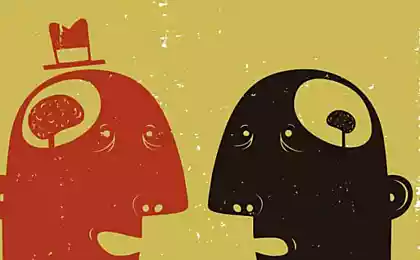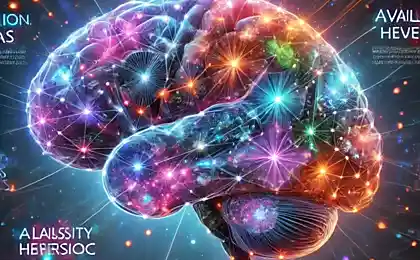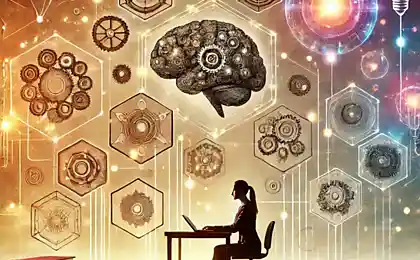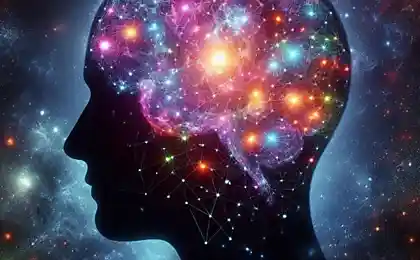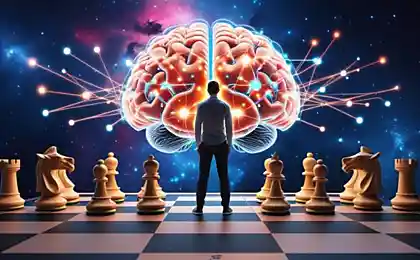963
58 "mistakes" of thinking that occur most often in people
System malfunction of your mozga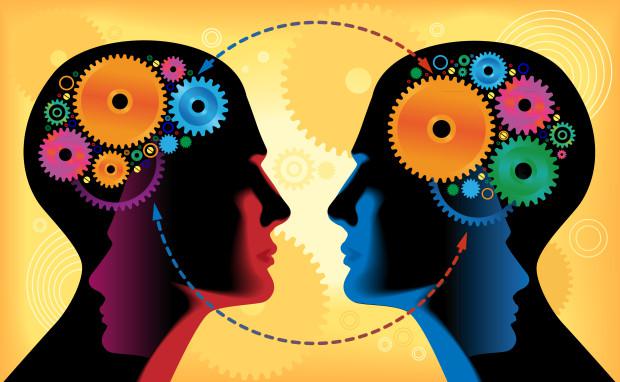
We used to consider himself through rational beings who can foresee any force majeure, and completely control everything that happens to us. However, according to psychologists, everyone is at the mercy of irrational prejudices and stereotypes that are sometimes forced him to act across its own benefit, while he "master of my life", taking this or that decision, often not even aware of, what is due to his choice. So, what really makes us do what we do?
1. Affective evristikaEto phenomenon can be called a kind of filter of emotions and feelings, through which people see the surrounding reality. For example, if on your computer screen within 1/30 second melknёt three words "court", "port" and "cake", and at the same time you will experience the feeling of hunger, you will see only the word "cake" because it is emotionally meaningful - this are the results of a set of experiments by psychologists.
2. Effect privyazkiSut phenomenon that when the projections with respect to any numerical value, people tend to call the number, received close to their previous numerical data. For example, during the discussion of wages by the applicant for the position and the employer receives the advantage of the first one to announce their figures - further proposals will be evaluated by both sides on the basis of the first option.
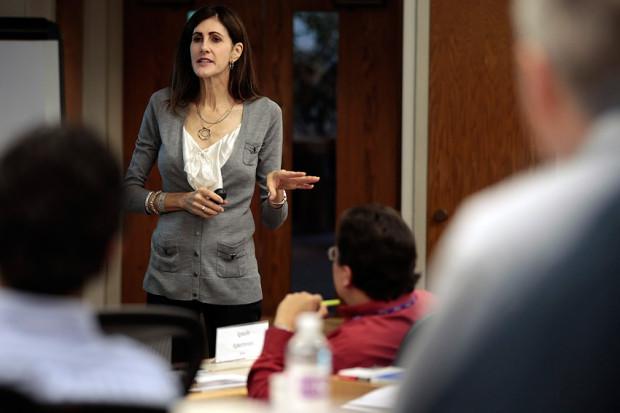
"Most people believe that they should not be the first to speak about the desired pay - explains Professor Lee Thompson of Northwestern University - but our study, like many others, proves the opposite - more given to those who first refers to their demands." < br />
3. Bias podtverzhdeniyaPri perception of information people seek to find in it the information supporting their own ideas and beliefs. Confirmation bias - one of the reasons why the witnesses of the same events often voiced opposite version prizoshedshego.
4. The effect of expectations nablyudatelyaFenomen very similar to the bias of confirmation, is that our expectations are able to influence the course of events, even if we do not realize. So, if the experiments the researcher expects to get a certain result, he may unconsciously manipulate the course of the experiment, even inadvertently make a mistake in the interpretation of the data, the result corresponded to expectations.
5. Herd instinkt
With such a phenomenon ever faced by virtually every one of you. Determined person in making a point of view, depends on how many people hold the same views.
6. Dead Zone cognitive iskazheniy
Failure to notice and to compensate for their cognitive stereotypes, unfortunately, is inherent in quite a few. "People often tend to see other people's cognitive biases and motivated, but are not aware of their own stereotypes" - says psychologist Emily Pronin of Princeton University. In other words - "in someone else's eye sees in his logs do not notice».
7. The distortion in the perception of their own vyboraPosle a selection is made, you are ready to defend it by all means, without noticing its weaknesses. For example, if your dog is bitten by a passer-by, you will surely decide that he was teasing her - it may be more aggressive dogs, but not yours.
8. Illusion klasterizatsiiBessoznatelnoe people's desire to see the patterns in the chain of random events into the hands of the owners of gambling establishments - in any casino is full of customers, convinced that if the previous four times dropped the "red", you need to put everything on him.
9. KonservatizmDovolno widespread phenomenon, which is more or less susceptible to most people - the desire to preserve the original point of view, even if obtained clear evidence that it is erroneous. A great example - many continue to believe that our planet is flat, even when scientists proved that the Earth is a sphere.
10. KonformnostStremlenie behave "like everyone else" is also very characteristic feature of many people. It is so strong that it causes a person to do absurd things when he sees them doing the other. It shows quite clearly psychologist Solomon Asch experiment - in the course of the study volunteers were asked to rate the value of the rectangles, with independent participants included groups of "decoy" subjects who at the request of the head of research gave false answers. 75% of independent volunteers at least once agreed with the absurd opinion voiced by other members of the group.
11. "Curse of Knowledge" has knowledge of the subject or problem is extremely difficult to put yourself in the place of those who do not have such information. This phenomenon is well-illustrated in the series "The Big Bang Theory" - intelligent and erudite Sheldon Cooper is sometimes very difficult to understand his neighbor Penny.
12. Effect primankiYavlenie, also known as asymmetric dominance effect, is widely used in marketing. For example, if people are asked to buy a soda bottles in two different capacities, many will choose a smaller, but if you add as an option even larger bottle, the average volume of container in popularity among buyers will increase.
13. The effect of the value of money znakovSoglasno research scientists, people tend to willingly part with small denominations and coins than with the same amount, but in large denominations.
14. Ignoring term deystviyaEsli event is emotionally meaningful, the person does not pay attention to its duration. For example, a strong, but short-term pain of people remember is not worse than the duration of the pain.
15. The availability heuristic
Many people tend to overestimate the importance of the information available - for example, we all know about the dangers of smoking, but the discussion of some lead counterarguments, such as "My grandfather smoked three packs a day and lived to be 100 years old," ignoring the fact that such cases are likely exception to the rule.
16. Emotional razryvEmotsionalnoe human condition significantly impairs his ability to understand people who have a slightly different frame of mind - when you're happy, it's hard to imagine how someone might be sad. This rule works in the evaluation of their own actions - recalling their behavior, for example, during the flirting, we often can not understand the motives of their own actions.
17. Illusion chastotnostiKogda you learn any information that was available before, but did not reach you, and then confronted with this information, you get the impression that all around just talking about it - this phenomenon is also known, as a phenomenon Baader Meinhof.
18. The fundamental error atributsiiEtot curious phenomenon in varying degrees, is present in every human being - their own achievements we ascribe only their positive qualities and our failures, of course, are always associated with insurmountable circumstances, and vice versa - other people, in our opinion, come to success Only by luck and fiasco because of its shortcomings.
19. Effect GalateiOzhidanie success or failure largely determines the result of human actions - if he has programmed himself to achieve the goal, the success rate is increased, and vice versa, pessimism about their activities is likely to lead to its collapse.
20. Effect oreola
The total positive (or negative) impression of a person, event or object is often extended to his private signs. For example, people with good looks, we subconsciously perceive as clever, even before we learn them closer.
21. The effect of "hard-easy" forecasts about the probability of solving the problem often do not correspond to its complexity. People often overestimate their strength in addressing the challenges and underestimate themselves in the work on the simple.
22. Effect tolpyVo times of difficulty and uncertainty of the future, many are trying to stick to the most common behaviors among others - this phenomenon is observed, including in the securities market when coming changes in the value of shares or resource brokers are trying to make their predictions are not too different from expectations colleagues.
23. Retrospective iskazhenieOtsenivaya happened, they say, after the fact, people often claim that the development could easily guess - in other words, all love to be "wise in hindsight," and say, "I knew it!».
24. Revaluation skidokEsli a person two options received in advance - before, but smaller and later, but more likely he will choose the first option, and with the approach of the designated date, this probability increases.
25. ideomotor effekt
The simplest example of this phenomenon - when some sad thought is a man with tears, then have an idea of some action or feeling unconsciously becomes the act itself or the expression of the corresponding emotions. So, the boxer at the thought of a duel hand itself stretches to the jaw of an imaginary enemy, though this movement, as a rule, is not as pronounced as a real blow.
26. Illusion kontrolyaPrakticheski each of us faced with an unconscious desire to control events, which affect impossible. For example, football fans when watching a match like loud to give "guidance" to players, even though they know that during the game their "valuable advice" no impact.
27. Information iskazhenieNekotorye individuals tend to seek information even when possess full information, which is necessary to carry out a fruitful action or decision. At the same time, psychologists say that the extra information is often only hinder the achievement of the desired result.
28. The distortion in favor of his gruppyLyudi almost always appreciate those who are considered members of their social group more positively than "outsiders", and vice versa.
29. Irrational usileniePrinimaya decision on additional efforts to move to the target person is often based on the fact how much work has been invested to achieve it, even if it is clear that the goal is not worth your time and resources. This psychological effect is observed among the participants of auctions, when trying to outbid a competitor, they are referred to claims that are not able to pay.

30. Distortion toward negativaUchёnye long noticed that the negative experiences people tend to remember better and think back to them more often than a positive experience. This psychological phenomenon is also characterized by a preoccupation with the risks of ignoring the situation and available opportunities.
31. Underestimating bezdeystviya
Preference harmful active inactivity, but the deteriorating situation intervention in the course of events, there is not only at the domestic level, but also in politics. In one of his works of the American psychologist Art Markman, as an example of this curious phenomenon results in a case where President Obama has forced Congress to support a radical reform of health care. Republicans are hoping that all the negative phenomena in the health sector, which will undoubtedly be followed by the adoption of a legislative act, the citizens of the United States will in all blame the supporters of his Democratic, although likely if the decision on the reform failed to take, the consequences would have been much more catastrophic. < br />
32. Effect strausaMnogie people ignore the danger and threatened negative consequences of the situation, just like an ostrich hiding its head in the sand, creating the illusion of a lack of threat.
33. The distortion in favor rezultataOchen common phenomenon with which every one of you probably came across - not for assessment of the effectiveness of its objective and the result That is, if a person has won at the casino a huge amount of money, it does not mean that the idea of surrender to the whims of the roulette It can be considered brilliant. We must not forget that there is a place in the life of blind chance, so to predict the consequences of an act is sometimes impossible.
34. Over-uverennostPrakticheski all people firmly believe in the correctness of their judgments and estimates. How often do you hear someone talking about absolute probability of a scenario and is wrong? And how many times have you said the same thing wrong? Over-confidence is quite dangerous phenomenon because it forces to take undue risk.
35. Over-optimizm
A phenomenon similar to the over-confidence manifested in the tendency too positively evaluate the personal qualities of others and the likelihood of a positive resolution of a problem. The inability to see all possible threats makes a person vulnerable to intruders and vicissitudes.
36. Over-pessimizmKak you probably guessed, this phenomenon is the opposite of excessive optimism, that is, over-pessimistic people tend to focus on the possible negative consequences of their own or others' actions.
37. Effect platseboPrimery widely known phenomenon of the placebo can be found in almost all spheres of human activity - from medicine to trade securities. The bottom line is that confidence in a favorable outcome in itself can be a cause of it.
38. Error planirovaniyaNesposobnost understand how long the task will take a decision in people more often than we would like. Many people tend to underestimate the amount of work and "pitfalls" that may arise in the course of their implementation.
39. Delayed ratsionalizatsiyaPriobretya thing on apparently inflated price, people are often looking for a "rational" reasons for making a purchase - convince themselves and others that it is not wasted, that the thing was worth the money and eventually begin to wonder - they all could do without this precious junk?

40. Fixing ustanovkiChtoby understand what the essence of this phenomenon, imagine that the presiding psychological experiment. You ask subjects to press a button if they see on the screen a meaningless set of letters and other if there was a word. If the participants first show, for example, the word "water" and then associated within the meaning of the concept of, say, "drink", or "river", volunteers will respond to them faster than the words that have no water nothing. Fixing takes place, even if the person does not realize this - for example, when setting provides the incentive is very weak or distorted by other stimuli.
41. Distortion izobretatelyaNesposobnost adequately assess the pros and cons of their invention or innovation inherent in so many enterprising and talented people, especially if the state has allocated for innovative projects inventor huge amounts of money.
42. ProkrastinatsiyaS this phenomenon familiar to all, without exception, the inhabitants of our planet. Procrastination - not that other, as procrastination "for later", without taking into account the possible negative consequences.
43. Reactive soprotivlenieMnogim stubborn personalities tend to make decisions directly opposite to that advised the surrounding, in order to prove their right to freedom of choice. Recent manifestations of this phenomenon can be described in one phrase: "To spite her mother frostbitten ears».
44. Illusion noviznyEtot phenomenon is associated with the peculiarities of perception of words and phrases - often people think that the concept of a figure of speech, or is new, when in fact such structures are used for a long time.
45. Illusion vzaimnosti
Convinced that honesty and fairness in the relationship is always more important than any material and other interests.
46. Regression konservatizmNekotorye people to cope with the emergency situation with the help of emergency measures tend to use them, and after normalization of the situation, explaining that the extraordinary efficiency solutions. To make it clearer - lost in the taiga, it is best to call the rescue (of course, if there is a mobile phone or walkie-talkie), but do not disturb them whenever you find yourself in an unfamiliar area hometown.
47. Distortion sderzhannostiPereotsenka its ability to control the strong displays of emotion and confront various emotional impulses.
via factroom.ru

We used to consider himself through rational beings who can foresee any force majeure, and completely control everything that happens to us. However, according to psychologists, everyone is at the mercy of irrational prejudices and stereotypes that are sometimes forced him to act across its own benefit, while he "master of my life", taking this or that decision, often not even aware of, what is due to his choice. So, what really makes us do what we do?
1. Affective evristikaEto phenomenon can be called a kind of filter of emotions and feelings, through which people see the surrounding reality. For example, if on your computer screen within 1/30 second melknёt three words "court", "port" and "cake", and at the same time you will experience the feeling of hunger, you will see only the word "cake" because it is emotionally meaningful - this are the results of a set of experiments by psychologists.
2. Effect privyazkiSut phenomenon that when the projections with respect to any numerical value, people tend to call the number, received close to their previous numerical data. For example, during the discussion of wages by the applicant for the position and the employer receives the advantage of the first one to announce their figures - further proposals will be evaluated by both sides on the basis of the first option.

"Most people believe that they should not be the first to speak about the desired pay - explains Professor Lee Thompson of Northwestern University - but our study, like many others, proves the opposite - more given to those who first refers to their demands." < br />
3. Bias podtverzhdeniyaPri perception of information people seek to find in it the information supporting their own ideas and beliefs. Confirmation bias - one of the reasons why the witnesses of the same events often voiced opposite version prizoshedshego.
4. The effect of expectations nablyudatelyaFenomen very similar to the bias of confirmation, is that our expectations are able to influence the course of events, even if we do not realize. So, if the experiments the researcher expects to get a certain result, he may unconsciously manipulate the course of the experiment, even inadvertently make a mistake in the interpretation of the data, the result corresponded to expectations.
5. Herd instinkt

With such a phenomenon ever faced by virtually every one of you. Determined person in making a point of view, depends on how many people hold the same views.
6. Dead Zone cognitive iskazheniy

Failure to notice and to compensate for their cognitive stereotypes, unfortunately, is inherent in quite a few. "People often tend to see other people's cognitive biases and motivated, but are not aware of their own stereotypes" - says psychologist Emily Pronin of Princeton University. In other words - "in someone else's eye sees in his logs do not notice».
7. The distortion in the perception of their own vyboraPosle a selection is made, you are ready to defend it by all means, without noticing its weaknesses. For example, if your dog is bitten by a passer-by, you will surely decide that he was teasing her - it may be more aggressive dogs, but not yours.
8. Illusion klasterizatsiiBessoznatelnoe people's desire to see the patterns in the chain of random events into the hands of the owners of gambling establishments - in any casino is full of customers, convinced that if the previous four times dropped the "red", you need to put everything on him.
9. KonservatizmDovolno widespread phenomenon, which is more or less susceptible to most people - the desire to preserve the original point of view, even if obtained clear evidence that it is erroneous. A great example - many continue to believe that our planet is flat, even when scientists proved that the Earth is a sphere.
10. KonformnostStremlenie behave "like everyone else" is also very characteristic feature of many people. It is so strong that it causes a person to do absurd things when he sees them doing the other. It shows quite clearly psychologist Solomon Asch experiment - in the course of the study volunteers were asked to rate the value of the rectangles, with independent participants included groups of "decoy" subjects who at the request of the head of research gave false answers. 75% of independent volunteers at least once agreed with the absurd opinion voiced by other members of the group.
11. "Curse of Knowledge" has knowledge of the subject or problem is extremely difficult to put yourself in the place of those who do not have such information. This phenomenon is well-illustrated in the series "The Big Bang Theory" - intelligent and erudite Sheldon Cooper is sometimes very difficult to understand his neighbor Penny.
12. Effect primankiYavlenie, also known as asymmetric dominance effect, is widely used in marketing. For example, if people are asked to buy a soda bottles in two different capacities, many will choose a smaller, but if you add as an option even larger bottle, the average volume of container in popularity among buyers will increase.
13. The effect of the value of money znakovSoglasno research scientists, people tend to willingly part with small denominations and coins than with the same amount, but in large denominations.
14. Ignoring term deystviyaEsli event is emotionally meaningful, the person does not pay attention to its duration. For example, a strong, but short-term pain of people remember is not worse than the duration of the pain.
15. The availability heuristic
Many people tend to overestimate the importance of the information available - for example, we all know about the dangers of smoking, but the discussion of some lead counterarguments, such as "My grandfather smoked three packs a day and lived to be 100 years old," ignoring the fact that such cases are likely exception to the rule.
16. Emotional razryvEmotsionalnoe human condition significantly impairs his ability to understand people who have a slightly different frame of mind - when you're happy, it's hard to imagine how someone might be sad. This rule works in the evaluation of their own actions - recalling their behavior, for example, during the flirting, we often can not understand the motives of their own actions.
17. Illusion chastotnostiKogda you learn any information that was available before, but did not reach you, and then confronted with this information, you get the impression that all around just talking about it - this phenomenon is also known, as a phenomenon Baader Meinhof.
18. The fundamental error atributsiiEtot curious phenomenon in varying degrees, is present in every human being - their own achievements we ascribe only their positive qualities and our failures, of course, are always associated with insurmountable circumstances, and vice versa - other people, in our opinion, come to success Only by luck and fiasco because of its shortcomings.
19. Effect GalateiOzhidanie success or failure largely determines the result of human actions - if he has programmed himself to achieve the goal, the success rate is increased, and vice versa, pessimism about their activities is likely to lead to its collapse.
20. Effect oreola

The total positive (or negative) impression of a person, event or object is often extended to his private signs. For example, people with good looks, we subconsciously perceive as clever, even before we learn them closer.
21. The effect of "hard-easy" forecasts about the probability of solving the problem often do not correspond to its complexity. People often overestimate their strength in addressing the challenges and underestimate themselves in the work on the simple.
22. Effect tolpyVo times of difficulty and uncertainty of the future, many are trying to stick to the most common behaviors among others - this phenomenon is observed, including in the securities market when coming changes in the value of shares or resource brokers are trying to make their predictions are not too different from expectations colleagues.
23. Retrospective iskazhenieOtsenivaya happened, they say, after the fact, people often claim that the development could easily guess - in other words, all love to be "wise in hindsight," and say, "I knew it!».
24. Revaluation skidokEsli a person two options received in advance - before, but smaller and later, but more likely he will choose the first option, and with the approach of the designated date, this probability increases.
25. ideomotor effekt

The simplest example of this phenomenon - when some sad thought is a man with tears, then have an idea of some action or feeling unconsciously becomes the act itself or the expression of the corresponding emotions. So, the boxer at the thought of a duel hand itself stretches to the jaw of an imaginary enemy, though this movement, as a rule, is not as pronounced as a real blow.
26. Illusion kontrolyaPrakticheski each of us faced with an unconscious desire to control events, which affect impossible. For example, football fans when watching a match like loud to give "guidance" to players, even though they know that during the game their "valuable advice" no impact.
27. Information iskazhenieNekotorye individuals tend to seek information even when possess full information, which is necessary to carry out a fruitful action or decision. At the same time, psychologists say that the extra information is often only hinder the achievement of the desired result.
28. The distortion in favor of his gruppyLyudi almost always appreciate those who are considered members of their social group more positively than "outsiders", and vice versa.
29. Irrational usileniePrinimaya decision on additional efforts to move to the target person is often based on the fact how much work has been invested to achieve it, even if it is clear that the goal is not worth your time and resources. This psychological effect is observed among the participants of auctions, when trying to outbid a competitor, they are referred to claims that are not able to pay.

30. Distortion toward negativaUchёnye long noticed that the negative experiences people tend to remember better and think back to them more often than a positive experience. This psychological phenomenon is also characterized by a preoccupation with the risks of ignoring the situation and available opportunities.
31. Underestimating bezdeystviya

Preference harmful active inactivity, but the deteriorating situation intervention in the course of events, there is not only at the domestic level, but also in politics. In one of his works of the American psychologist Art Markman, as an example of this curious phenomenon results in a case where President Obama has forced Congress to support a radical reform of health care. Republicans are hoping that all the negative phenomena in the health sector, which will undoubtedly be followed by the adoption of a legislative act, the citizens of the United States will in all blame the supporters of his Democratic, although likely if the decision on the reform failed to take, the consequences would have been much more catastrophic. < br />
32. Effect strausaMnogie people ignore the danger and threatened negative consequences of the situation, just like an ostrich hiding its head in the sand, creating the illusion of a lack of threat.
33. The distortion in favor rezultataOchen common phenomenon with which every one of you probably came across - not for assessment of the effectiveness of its objective and the result That is, if a person has won at the casino a huge amount of money, it does not mean that the idea of surrender to the whims of the roulette It can be considered brilliant. We must not forget that there is a place in the life of blind chance, so to predict the consequences of an act is sometimes impossible.
34. Over-uverennostPrakticheski all people firmly believe in the correctness of their judgments and estimates. How often do you hear someone talking about absolute probability of a scenario and is wrong? And how many times have you said the same thing wrong? Over-confidence is quite dangerous phenomenon because it forces to take undue risk.
35. Over-optimizm

A phenomenon similar to the over-confidence manifested in the tendency too positively evaluate the personal qualities of others and the likelihood of a positive resolution of a problem. The inability to see all possible threats makes a person vulnerable to intruders and vicissitudes.
36. Over-pessimizmKak you probably guessed, this phenomenon is the opposite of excessive optimism, that is, over-pessimistic people tend to focus on the possible negative consequences of their own or others' actions.
37. Effect platseboPrimery widely known phenomenon of the placebo can be found in almost all spheres of human activity - from medicine to trade securities. The bottom line is that confidence in a favorable outcome in itself can be a cause of it.
38. Error planirovaniyaNesposobnost understand how long the task will take a decision in people more often than we would like. Many people tend to underestimate the amount of work and "pitfalls" that may arise in the course of their implementation.
39. Delayed ratsionalizatsiyaPriobretya thing on apparently inflated price, people are often looking for a "rational" reasons for making a purchase - convince themselves and others that it is not wasted, that the thing was worth the money and eventually begin to wonder - they all could do without this precious junk?

40. Fixing ustanovkiChtoby understand what the essence of this phenomenon, imagine that the presiding psychological experiment. You ask subjects to press a button if they see on the screen a meaningless set of letters and other if there was a word. If the participants first show, for example, the word "water" and then associated within the meaning of the concept of, say, "drink", or "river", volunteers will respond to them faster than the words that have no water nothing. Fixing takes place, even if the person does not realize this - for example, when setting provides the incentive is very weak or distorted by other stimuli.
41. Distortion izobretatelyaNesposobnost adequately assess the pros and cons of their invention or innovation inherent in so many enterprising and talented people, especially if the state has allocated for innovative projects inventor huge amounts of money.
42. ProkrastinatsiyaS this phenomenon familiar to all, without exception, the inhabitants of our planet. Procrastination - not that other, as procrastination "for later", without taking into account the possible negative consequences.
43. Reactive soprotivlenieMnogim stubborn personalities tend to make decisions directly opposite to that advised the surrounding, in order to prove their right to freedom of choice. Recent manifestations of this phenomenon can be described in one phrase: "To spite her mother frostbitten ears».
44. Illusion noviznyEtot phenomenon is associated with the peculiarities of perception of words and phrases - often people think that the concept of a figure of speech, or is new, when in fact such structures are used for a long time.
45. Illusion vzaimnosti

Convinced that honesty and fairness in the relationship is always more important than any material and other interests.
46. Regression konservatizmNekotorye people to cope with the emergency situation with the help of emergency measures tend to use them, and after normalization of the situation, explaining that the extraordinary efficiency solutions. To make it clearer - lost in the taiga, it is best to call the rescue (of course, if there is a mobile phone or walkie-talkie), but do not disturb them whenever you find yourself in an unfamiliar area hometown.
47. Distortion sderzhannostiPereotsenka its ability to control the strong displays of emotion and confront various emotional impulses.
via factroom.ru
In the 1960s, American society has called Rod put animals
The Vatican is not part of the European Union - do not let it go







